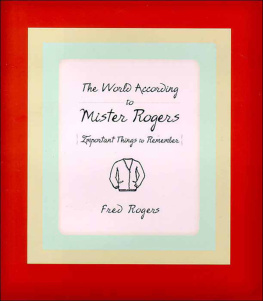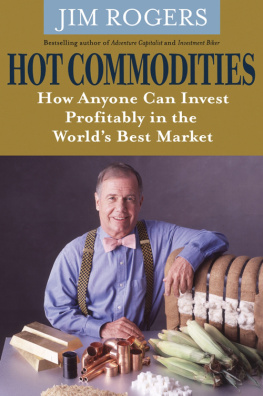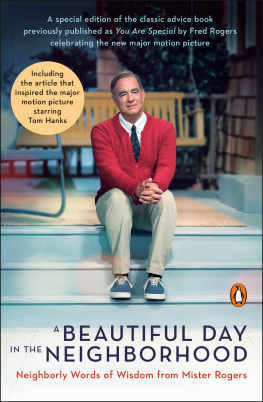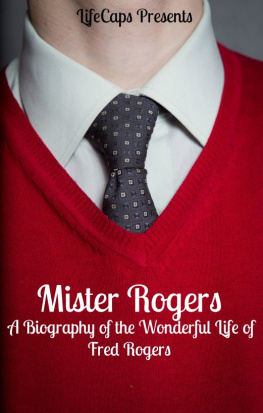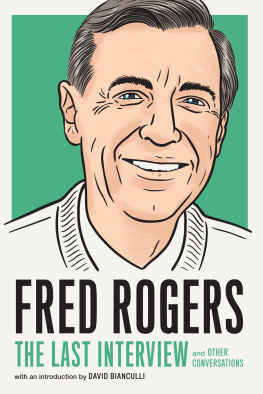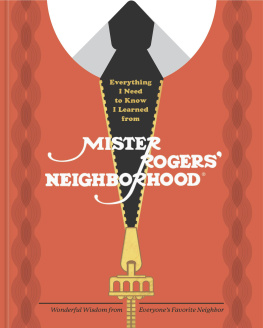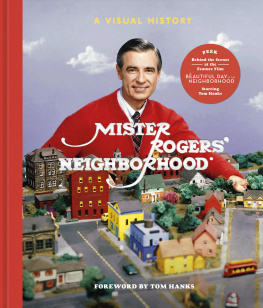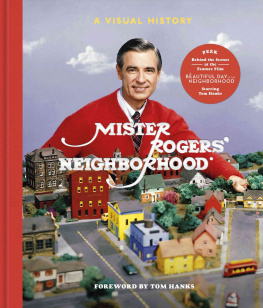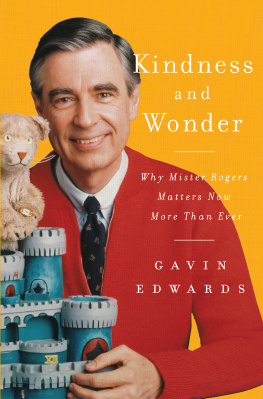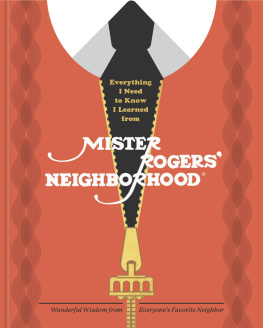He has achieved success who has lived well, laughed often, and loved much, who has enjoyed the trust of pure women, the respect of intelligent men, and the love of little children, who has filled his niche and accomplished his task, who has left the world better than he found it, whether by an improved poppy, a perfect poem, or a rescued soul, who has never lacked appreciation of Earths beauty or failed to express it, who has always looked for the best in others and given them the best he had, whose life was an inspiration, whose memory a benediction.
B ESSIE A NDERSON S TANLEY
There were always quotes like that tucked away in Freds wallet, next to his neatly folded bills, or in the pages of his daily planner book. Perhaps he liked having words of wisdom close to him, as if he wantedor neededto be constantly reminded of what was important in life. The outside world may have thought his qualities of wisdom and strength came naturally to him, but those close to him knew that he was constantly striving to be the best that he could be. He was as human as the rest of us.
I first met Fred at Rollins College. He was planning to transfer there from Dartmouth Collegeto major in musicand a group of us music students were asked to show him around. We were delighted at the prospect of a new kid on campus. One of our friends had a wonderful, roomy old (almost antique!) Franklin car, and we all went to the train station to welcome Fred. After the tour, we took him to see the music rooms, where we spent many hours of our college lives, and he immediately sat down at a piano. We loved his playing. Few of our small group could play the jazz and popular songs of our day with so much ease and grace. And he could play the classics, too. This new kid really had talent!
The next semester he arrived, and he fit in beautifully. He was a lot of fun and became quite popular, and after a year or so he fulfilled the leadership potential that would follow him the rest of his life. We both formed lasting friendships at Rollins. Fred and I were together much of the time and our friendship became deep and strong. I suppose our friends probably thought of us as a couple. We went to many dances together, and once Fred and I won first prize for our Raggedy Ann and Andy costumes. The prize was a big bottle of champagnewhat a gift for two teetotalers! We had great fun going from table to table and pouring it for everyone else.
It was not all fun and games for Fredhe had his struggles, too, as we all did. I remember his moaning and groaning to us, I just know Im going to fail this course! Of course, wed all get worried for him. Then hed get an Aand wed all get mad at him. (When he graduated, it was with a double major and high honors.) But Fred worked with discipline, while being a good friend to many during those happy college years.
Later on, he brought that same sense of hard work and inner discipline to his work. Whether he was working on a script for the Neighborhood programs or on a speech, he fretted over the words, attempting to make the content meaningful. I can remember his saying over and over again, as he worked at the fourth or fifth draft of whatever he happened to be writing, Simple is better.
Since Fred had lost a year by transferring from one college to another, I was in the class ahead of him and went on to Florida State University for a masters degree in music, where I remained for the next two years. There was a trip back to Rollins to see Fred graduate, and we wrote letters to each other occasionally. I was busy and he was busy. He was, by then, in New York at NBC, in an apprentice program, and fortunately his assignments were with the music programs, among them the NBC Opera Theatre. How stimulating and challenging those days of early television were for Fred. By the spring of his first year there, April 1952, I got a letter from him with a proposal of marriage! I was too excited to take the time to write a letter, so I accepted his proposal from a pay-phone booth. We were married in July 1952.
After seven years of marriage, our first son was born, and just twenty-one months later we welcomed our second son into our family. Fred was, by that time, very busy with his early work in Pittsburgh, developing an educational television program for children and attending classes at the theological seminary (during his lunch hour or in the evenings). His early work in TV was all behind-the-scenes, as puppeteer and musician, and that was quite comfortable for him, because Fred was basically shy. It took courage and a lot of support when he faced the cameras for the first Neighborhood programs. Someone once asked which one of his puppets resembled him the most. It was, of course, Daniel Striped Tigeran uncharacteristically shy tiger. Despite Freds tendency to shyness, that trait never got in the way of his capacity to make many friends, to whom he readily lent an empathetic ear. Fred was always a good listener for as long as I knew him.
He was most relaxed at the piano. Often hed play his own music that hed written for the Neighborhood programs. Sometimes hed improvise music that would be very complex and emotional in tone. It was his way of dealing with his feelings. Then sometimes hed just enjoy playing a lot of different tunes that he loved. Some were songs, like Misty, that Johnny Costa (the inimitable music director/pianist for the Neighborhood ) had arranged for Fred. What a treat it was for those of us who were able to listenfrom a distance, so as not to disturb his piano reverie.
What influenced and changed his life more than anything, in my opinion, was what he learned from Dr. Margaret McFarland. She was his mentor in the child development graduate program at the University of Pittsburgh. She let him know it was okay to be sensitive, and helped him find the courage to be himself with childrenand with the rest of the world.
Margaret once said that Fred was more in touch with his own childhood than anyone she knew. Under her guidance, he brought his puppets and music to children, and she helped him learn about child development. But I also saw the strength she gave him by supporting him to bring his own creative self to what he was learning. Ive always thought of Fred as a creative artist, and I truly believe it was through Margaret that he was able to find the courage and determination to use his knowledge and talentsand in fact, his whole lifein the service of children.
The person Fred became in his later years came out of growth and struggle. As he got older, it seemed as if the nurturing of his soul and mind became more and more important. He read with pleasure the works of friends and others he admired and respected, and he began each day with prayers for a legion of family and friends and, in general, for the peacemakers of the world. Reading the Bible was also part of this early morning routinebefore he went for his daily swim. He worked hard at being the best he could be. In fact, it seems to me he worked a lot more than he played. Discipline was his very strong suit. If I were asked for three words to describe him, I think those words would be courage, love, and discipline perhaps in that very order.
He worked so hard at being other-oriented (not self-centered) that hed often express himself by using the first person plural. Hed say, Were doing this or that. It was almost always we. People might sometimes have wondered who else he was including. Perhaps he was simply making an effort to ensure that his colleagues and coworkers were equally recognized and valued for the work in which they all were so invested. That wouldve been Freds wish.
A quote he loved especiallyand carried around with himwas from Mary Lou Kownacki: There isnt anyone you couldnt love once youve heard their story. There were many times I wanted to be angry at someone, and Fred would say, But I wonder what was going on in that persons day. His capacity for understanding always amazed me.

